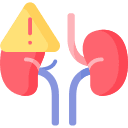TRANYLCYPROMINE
THERAPEUTICS
brands
Class
- Neuroscience-based Nomenclature: serotonin, norepinephrine, dopamine multimodal enzyme inhibitor (SN-MM)
- Monoamine oxidase inhibitor (MAOI)
TRANYLCYPROMINE commonly prescribed for
(Bold for FDA approved)
 How TRANYLCYPROMINE works
How TRANYLCYPROMINE works
• Irreversibly blocks monoamine oxidase (MAO) from breaking down norepinephrine, serotonin, and dopamine
• This boosts noradrenergic, serotonergic, and dopaminergic neurotransmission
• As the drug is structurally related to amphetamine, it may have some stimulantlike actions due to monoamine release and reuptake inhibition
How long until TRANYLCYPROMINE works
• Some patients may experience stimulantlike actions early in dosing
• Onset of therapeutic actions usually not immediate, but often delayed 2–4 weeks following adequate dosing
• If it is not working within 6–8 weeks, it may require a dosage increase or it may not work at all
• May continue to work for many years to prevent relapse of symptoms
SIDE EFFECTS
 Notable Side Effects
Notable Side Effects
• Agitation, anxiety, insomnia, weakness, sedation, dizziness
• Change in appetite, weight gain
• Sexual dysfunction (less than with other MAOIs such as phenelzine)
• Orthostatic hypotension (dose-related); syncope may develop at high doses
 Life Threatening Side Effects
Life Threatening Side Effects
• Hypertensive crisis (when MAOIs are used with certain tyramine-containing foods or prohibited drugs)
• Induction of mania in patients with bipolar disorder
• Rare seizures
• Rare hepatotoxicity
weight gain

not usual
sedation

common
What to do about TRANYLCYPROMINE side effects
• Wait
• Wait
• Wait
• Lower the dose
• Take at night if daytime sedation; take in daytime if overstimulated at night
• Switch after appropriate washout to an SSRI or newer antidepressant
DOSING AND USE
usual dosage range
• 30−50 mg/day in divided doses
 Dosage Forms
Dosage Forms
• Tablet 10 mg
long term use
• Consider periodic evaluation of hepatic function
• MAOIs may lose efficacy long-term
habit forming
• Dependence to MAOIs reported but rare
SPECIAL POPULATIONS
 Renal Impairment
Renal Impairment
• Use with caution – drug may accumulate in plasma
• May require lower than usual adult dose
 Hepatic Impairment
Hepatic Impairment
• Tranylcypromine should be used cautiously in patients with history of hepatic impairment or in patients with abnormal liver function tests
 Cardiac Impairment
Cardiac Impairment
• Contraindicated in patients with cardiac impairment unless cleared by the patient’s medical doctor
 Elderly
Elderly
• Initial dose often lower than usual adult dose
• Elderly patients may have greater sensitivity to adverse effects, but many tolerate MAOIs
• Reduction in the risk of suicidality with antidepressants compared to placebo in adults age 65 and older
 Children and Adolescents
Children and Adolescents
• Not generally recommended for use in children under age 18
• Carefully weigh the risks and benefits of pharmacological treatment against the risks and benefits of nontreatment with antidepressants and make sure to document this in the patient’s chart
• Monitor patients face-to-face regularly, particularly during the first several weeks of treatment
• Use with caution, observing for activation of known or unknown bipolar disorder and/ or suicidal ideation, and inform parents or guardians of this risk so they can help observe child or adolescent patients
 Pregnancy
Pregnancy
• Effective June 30, 2015, the FDA requires changes to the content and format of pregnancy and lactation information in prescription drug labels, including the elimination of the pregnancy letter categories; the Pregnancy and Lactation Labeling Rule (PLLR or final rule) applies only to prescription drugs and will be phased in gradually for drugs approved on or after June 30, 2001
• Controlled studies have not been conducted in pregnant women
• Not generally recommended for use during pregnancy, especially during first trimester
• Should evaluate patient for treatment with an antidepressant with a better risk/benefit ratio
• National Pregnancy Registry for Antidepressants: 1-866-961-2388, https://womensmentalhealth.org/research/ pregnancyregistry/antidepressants
 Breast Feeding
Breast Feeding
• Some drug is found in mother’s breast milk
• Effects on infant unknown
• Immediate postpartum period is a high-risk time for depression, especially in women who have had prior depressive episodes, so drug may need to be reinstituted late in the third trimester or shortly after childbirth to prevent a recurrence during the postpartum period
• Should evaluate patient for treatment with an antidepressant with a better risk/benefit ratio
Based on data Published online by Cambridge University Press
Compiled by Dr. Jash Ajmera